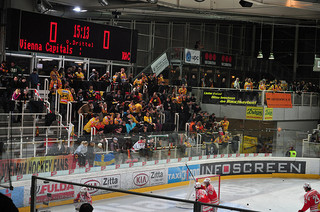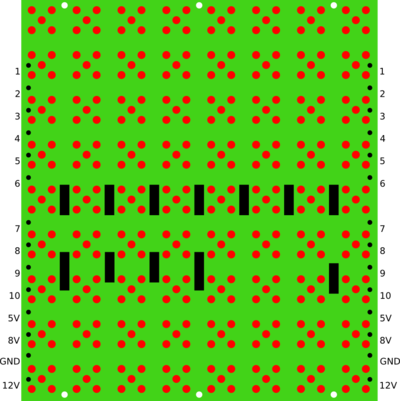Blinkofant: Unterschied zwischen den Versionen
Pk (Diskussion | Beiträge) +img (LED wall history) |
Legba7 (Diskussion | Beiträge) →Software: Schnellschusspinbelegung |
||
| (17 dazwischenliegende Versionen von 7 Benutzern werden nicht angezeigt) | |||
| Zeile 3: | Zeile 3: | ||
== WTF? == | == WTF? == | ||
Recently we got | Recently we got [[Blinkofant/LED-Display History|these *huge* LED walls]]. | ||
We disassmbled the monster and now we got ~300 LED panels | We disassmbled the monster and now we got ~300 LED panels | ||
Each of the 8*9 pixels consists of 5 LEDs = 360 red LEDs per panel<br /> | Each of the 8*9 pixels consists of 5 LEDs = 360 red LEDs per panel<br /> | ||
300 panels equals | 300 panels equals 100.000++ LEDs :)<br/> | ||
<br/> | |||
1 panel full on needs 1.15 AMP @12V | |||
we don't know how to power them yet :) | <strike>we don't know how to power them yet :)</strike><br/> | ||
<strike> we are probably going to use the trafo we got out of the old displays.<br/>needs drehstrom outputs 140 AMP 12V weights 40kg+</strike><br/> | |||
actually we might use a lot of ATX powersupplies<br/> | |||
There is a mailinglist for the blinkofant project see: blinkofant@lists.metalab.at | |||
== Pinout == | == Pinout == | ||
| Zeile 48: | Zeile 54: | ||
| 6 | | 6 | ||
| ClkBlink EQU 3 ;clock for blinking (0...off, 1...on) | | ClkBlink EQU 3 ;clock for blinking (0...off, 1...on) | ||
| | | clock for blinking of selected rows | ||
|- | |- | ||
| 7 | | 7 | ||
| Zeile 69: | Zeile 75: | ||
On the last Panel of a row the following pins need to be connected on the output side: | |||
pin 1 -> pin 8<br /> | pin 1 -> pin 8<br /> | ||
pin 2 -> pin 3 | pin 2 -> pin 3 | ||
| valign="top"| | == Software == | ||
Aktuelle Testfirmware für den Arduino liegt im GIT von 5uper.net ( git clone git@5uper.net:ledmatrix.git ) | |||
Ein clone des git-repos ist auf [https://github.com/parasew/blinkofanten github/parasew] | |||
Es gibt auch eine [http://pastebin.com/7GS76STv für avr-gcc angepasste Version]. | |||
Schnellshusspinbelegung ala enterhaken: | |||
<pre> | |||
| arduino | panel | | |||
|---------+-------| | |||
| gnd | gnd | | |||
| 13 | 4 | | |||
| 11 | 8 | | |||
| 10 | 10 | | |||
|---------+-------| | |||
</pre> | |||
this is the magic: | |||
SPI.begin(); | |||
SPI.setBitOrder(LSBFIRST); | |||
SPI.setDataMode(SPI_MODE0); | |||
SPI.setClockDivider(SPI_CLOCK_DIV128); // biggest divider there is. | |||
... | |||
SPDR = panelData[i]; | |||
while(!(SPSR & (1<<SPIF))); | |||
<pre> | |||
ein panel besteht aus 8*9 pixel (8 spalten mal 9 pixel) | |||
man schiebt 10 bits an daten rein für jede der 8 spalten | |||
9 bits an/aus pro pixel + 1 bit ob diese spalte blinkt | |||
wenn man das blinkybit gesetzt hat kann man auf pin6 eine | |||
clock anlegen die die blinkenrate vorgibt | |||
</pre> | |||
=== Borards === | |||
* ATTINY2313 .. das wird teuer | |||
* Logic IC für puffer und RX ? welche? | |||
* 2x mod8 buchse (rj45) ?! das wird auch teuer.. | |||
* kondensatoren | |||
* eventuell stecker für kabelverbinder zum led modul | |||
|valign="top"| | |||
<center>[[Datei:Albert-Schultz-Eishalle-by-kerky_oe.jpg|center|framed|<small>[[Blinkofant/LED-Display History|Albert Schultz ice arena LED wall]] © [http://www.flickr.com/photos/kerky_oe/5313588854/sizes/n/in/photostream/ kerky_oe]</small>]] </center> | <center>[[Datei:Albert-Schultz-Eishalle-by-kerky_oe.jpg|center|framed|<small>[[Blinkofant/LED-Display History|Albert Schultz ice arena LED wall]] © [http://www.flickr.com/photos/kerky_oe/5313588854/sizes/n/in/photostream/ kerky_oe]</small>]] </center> | ||
| Zeile 81: | Zeile 134: | ||
[[Bild:ledmatrix_chained.png|thumb|400px|right| 4 module chained]] | [[Bild:ledmatrix_chained.png|thumb|400px|right| 4 module chained]] | ||
|} | |} | ||
[[Kategorie:English]] | |||
[[Kategorie:Hauptraum]] | |||
[[Kategorie:Projekte]] | |||
Aktuelle Version vom 13. August 2013, 18:44 Uhr
WTF?Recently we got these *huge* LED walls. We disassmbled the monster and now we got ~300 LED panels Each of the 8*9 pixels consists of 5 LEDs = 360 red LEDs per panel
Pinout
pin 1 -> pin 8 SoftwareAktuelle Testfirmware für den Arduino liegt im GIT von 5uper.net ( git clone git@5uper.net:ledmatrix.git ) Ein clone des git-repos ist auf github/parasew Es gibt auch eine für avr-gcc angepasste Version. Schnellshusspinbelegung ala enterhaken: | arduino | panel |
|---------+-------|
| gnd | gnd |
| 13 | 4 |
| 11 | 8 |
| 10 | 10 |
|---------+-------|
this is the magic: SPI.begin(); SPI.setBitOrder(LSBFIRST); SPI.setDataMode(SPI_MODE0); SPI.setClockDivider(SPI_CLOCK_DIV128); // biggest divider there is. ... SPDR = panelData[i]; while(!(SPSR & (1<<SPIF))); ein panel besteht aus 8*9 pixel (8 spalten mal 9 pixel) man schiebt 10 bits an daten rein für jede der 8 spalten 9 bits an/aus pro pixel + 1 bit ob diese spalte blinkt wenn man das blinkybit gesetzt hat kann man auf pin6 eine clock anlegen die die blinkenrate vorgibt
Borards
|
   |